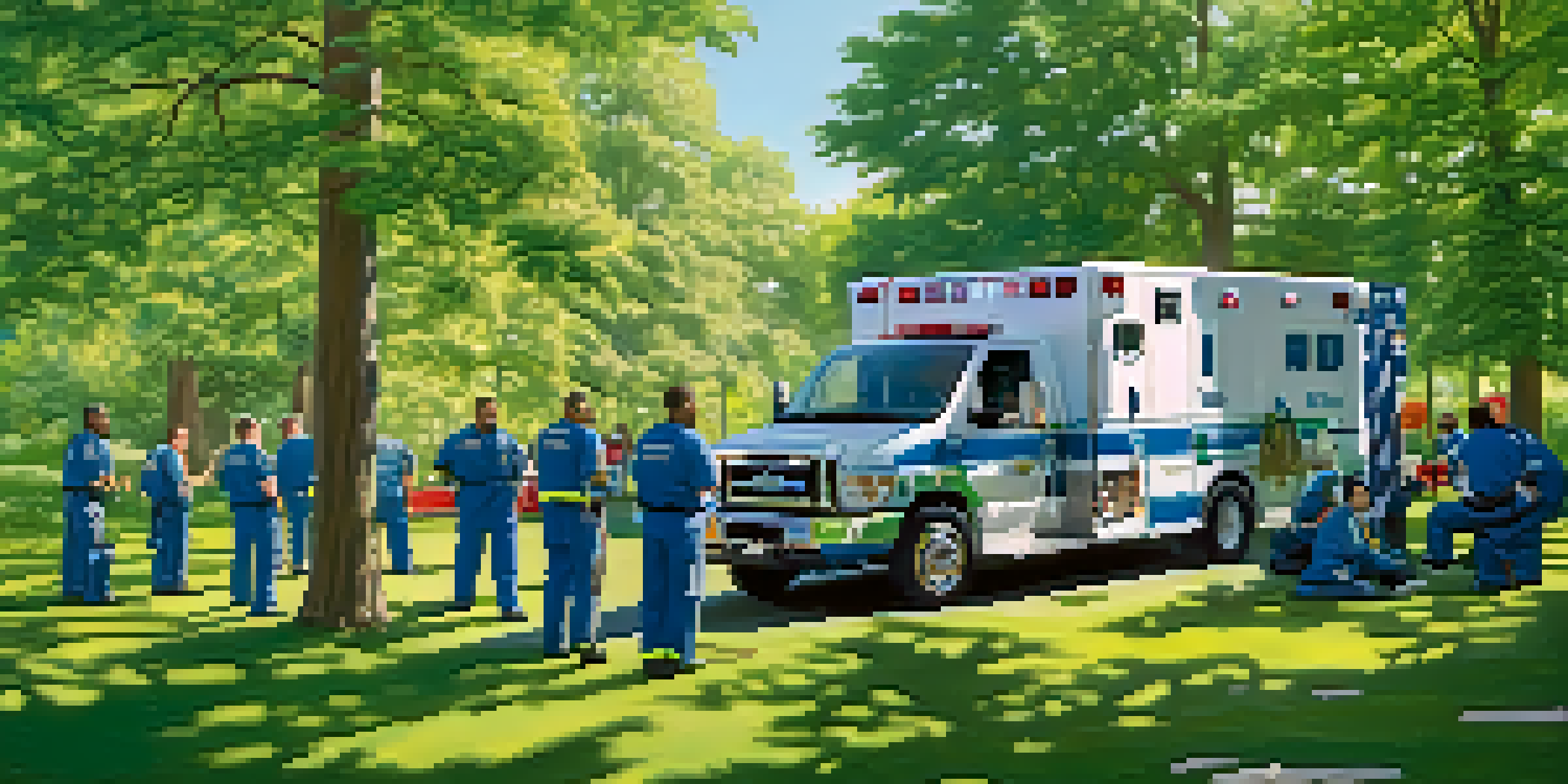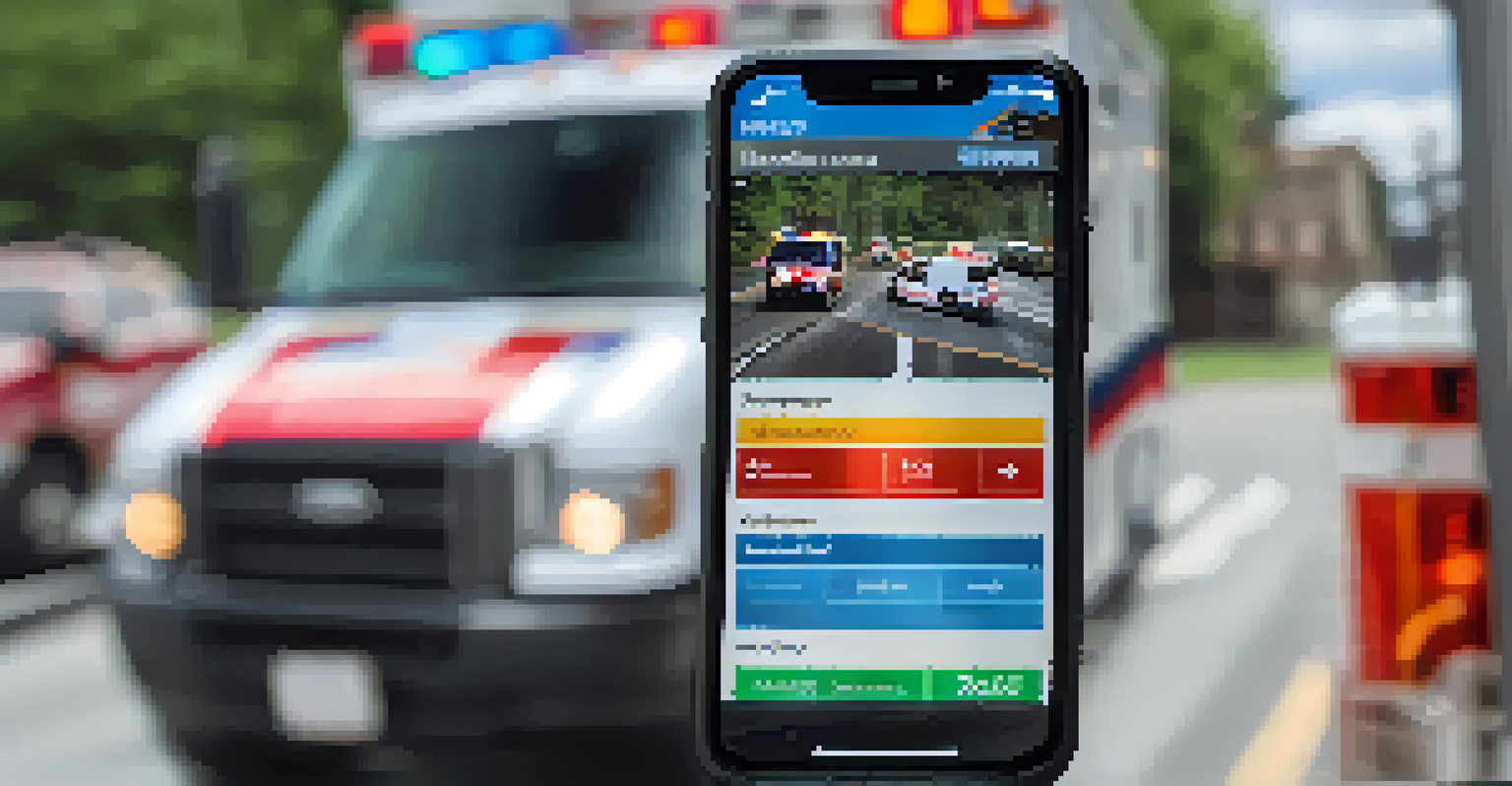Adapting Emergency Response Training for Marijuana Incidents

Understanding the Unique Challenges of Marijuana Incidents
Marijuana incidents can be vastly different from traditional emergencies, often requiring specialized knowledge. For example, first responders might encounter situations involving impaired drivers or those experiencing adverse reactions after consumption. Understanding these nuances is crucial for effective emergency response.
The greatest weapon against stress is our ability to choose one thought over another.
Furthermore, marijuana's legal status varies across regions, which can complicate emergency scenarios. Responders must be aware of local laws to navigate these situations properly. This legal knowledge helps in making informed decisions, ensuring both safety and compliance.
Lastly, public perception and stigma surrounding marijuana can influence emergency response. Responders may face unique challenges in addressing community concerns while providing care. This requires a balanced approach that respects both the law and community attitudes.
Implementing Specialized Training Modules for First Responders
To effectively address marijuana incidents, training programs should include specialized modules focusing on cannabis-related emergencies. This might involve simulations of scenarios such as overdose or impaired driving due to marijuana. By practicing these specific situations, responders can build confidence and competence.

Additionally, incorporating information on the physiological effects of marijuana can enhance responders' understanding. Knowledge about how marijuana affects the body and mind prepares them to assess and treat affected individuals more effectively. This understanding bridges the gap between theory and practical application.
Specialized Training for Responders
Training programs must include modules on cannabis-related emergencies to enhance responders' confidence and effectiveness.
Finally, ongoing training sessions should be established to keep responders updated on evolving marijuana legislation and best practices. Regular refreshers will ensure that teams remain knowledgeable and adaptive to changes in the field. A commitment to continuous learning is crucial for maintaining effective response capabilities.
Collaboration with Medical Professionals for Enhanced Response
Collaboration between emergency responders and medical professionals is vital in marijuana-related incidents. Engaging with healthcare providers can lead to shared insights on best practices for treatment and care. This partnership fosters a comprehensive approach to managing emergencies effectively.
Collaboration allows us to know more than we are capable of knowing by ourselves.
Involving medical professionals in training sessions can also provide valuable perspectives on patient assessment and intervention. For instance, understanding different strains of marijuana and their effects can guide responders in their initial evaluations. Such knowledge equips teams to deliver more targeted care.
Moreover, establishing a communication channel between responders and health facilities can streamline the transfer of information during emergencies. This collaboration ensures that all parties are on the same page, facilitating quicker and more effective responses. It’s about building a supportive network that enhances overall emergency care.
Utilizing Technology for Effective Incident Management
In today’s digital age, technology plays a pivotal role in enhancing emergency response. Leveraging mobile apps and databases can provide responders with real-time information about marijuana-related incidents. This immediate access to data can significantly improve decision-making during emergencies.
For example, using a mobile app to report incidents can help track trends in marijuana use and its impact on public safety. These insights can guide policy-making and training efforts. Technology can serve as a powerful tool in understanding and managing marijuana-related emergencies.
Collaboration with Healthcare Experts
Engaging medical professionals in training and incident management can improve the quality of care during marijuana-related emergencies.
Additionally, virtual reality (VR) simulations can offer immersive training experiences for responders. These simulations can replicate high-pressure situations involving marijuana, allowing responders to practice their skills in a controlled environment. Such innovative approaches can enhance preparedness and response capabilities.
Creating Public Awareness Campaigns on Marijuana Safety
Public awareness campaigns are essential in educating the community about marijuana safety and responsible use. These campaigns can help reduce the stigma associated with marijuana while informing individuals about potential risks. Knowledge is a powerful tool in preventing emergencies related to marijuana use.
Engaging local organizations and stakeholders in these campaigns can amplify their reach and impact. By collaborating with schools, health departments, and community groups, responders can foster a culture of safety and awareness. This collective effort can lead to more informed citizens, ultimately resulting in fewer emergencies.
Moreover, campaigns can emphasize the importance of seeking help in emergencies related to marijuana. Clear messaging about when and how to contact emergency services can ensure that individuals know where to turn during a crisis. Empowering the public is a crucial component in preventing adverse situations.
Evaluating and Adjusting Training Programs Based on Feedback
Regular evaluation of emergency response training programs is crucial for continuous improvement. Gathering feedback from responders after training sessions can provide insights into what works and what doesn’t. This evaluative approach allows for adjustments that enhance the effectiveness of the training.
Moreover, incorporating real-life case studies and scenarios into the training can offer valuable learning opportunities. Analyzing past incidents involving marijuana can help identify gaps in response and inform training content. Learning from experience is key to refining emergency response strategies.
Public Awareness on Marijuana Safety
Educating the community about marijuana safety and responsible use is crucial for reducing stigma and preventing emergencies.
Finally, fostering an environment of open communication encourages responders to share their experiences and suggestions. When team members feel comfortable providing input, training programs can evolve to meet their needs effectively. This adaptability is vital in a constantly changing landscape.
Ensuring Mental Health Support for First Responders
The stress of responding to marijuana-related incidents can take a toll on first responders' mental health. It's essential to prioritize their well-being by providing access to mental health resources. Support systems can help them cope with the unique challenges they face in the field.
Offering regular debriefing sessions after incidents allows responders to process their experiences and emotions. These sessions can create a safe space for sharing thoughts and feelings, fostering camaraderie among team members. Mental health support is a crucial aspect of maintaining a resilient response team.

Additionally, training programs should include components on self-care and stress management techniques. Equipping responders with tools to cope with the pressures of their roles can enhance their overall performance. A healthy workforce is better prepared to handle emergencies effectively.